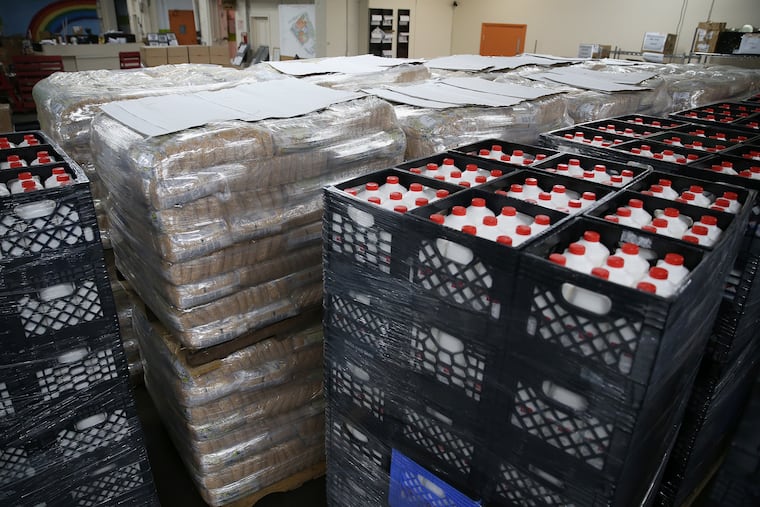Food program stepping up to save school lunches, food for low-income people
The public didn’t see, but hunger fighters know that a speeding bullet was just dodged.

This is the story of a food disaster that nearly was.
Philadelphia Warehousing & Cold Storage has for decades stored and distributed U.S. Department of Agriculture food for Philadelphia-area school lunches. It has done the same for USDA food for the Emergency Food Assistance Program (TEFAP) — excess product from farmers given to low-income Americans.
In late April, Philly Cold, as the 120-year-old Old City company is known, quietly announced that it was going out of business, shuttering 335,000 square feet of refrigerated and dry storage space.
“People were panicking throughout the commonwealth,” said George Matysik, newly installed executive director of Share Food Program, a Hunting Park nonprofit and anti-hunger advocacy group that supplies food to hundreds of food pantries.
“We were bordering on a crisis. More than anything else," he said, "it’s about schoolkids getting the food they need.”
Who, everyone wondered, was going to handle all that product?
After some maneuvering by the Pennsylvania Department of Agriculture and some timely (and costly) alterations by Matysik and his team, Share was able to save the day, said Caryn Long Earl, director of the state department’s bureau of food distribution.
To the outside world, nothing will have changed. But hunger fighters know that a speeding bullet was just dodged.
‘Emergency action’
Earl had characterized the scramble to find a new home for tons of food as an “emergency action” in an email informing people that Share had taken on the responsibility.
In an interview, Earl said this marks the first time in state history that a nonprofit will assume the contract to deal with school foods and TEFAP. Share will pick up the remaining two years of the current contract between the federal government and Philly Cold.
“It’s a huge deal that Share is willing to take this on," she said. “We just found out in late April that Philly Cold was closing. And a for-profit place would have gotten double what Share is" to take on the food.
Much of Philadelphia is familiar with the main Philly Cold building, even if folks don’t know the purpose of the huge brick edifice on Columbus Boulevard, visible from I-95. It’s characterized by the painting of a gigantic American flag on the side.
The company’s three buildings were constructed by the Reading Co. in 1891, said Philly Cold president Ray Tarnowski.
Unwilling to offer details, Tarnowski said only that “it was a shareholder decision to go out of business." The company’s owners did not respond to an interview request.
More freezer space
To accommodate the extra food it will be taking on, Share will be investing in about 20,000 square feet of additional freezer space, Matysik said. Share’s warehouse measures 130,000 square feet.
The changes could cost Share about $3.5 million, he said. Extra fund-raising and money from the federal contract will help defray some costs, he added.
Share can expect to receive as much as $428,000 to store and deliver the 120,000 cases of National School Lunch food on order for schools in Philadelphia and its four surrounding counties for the next school year, Earl said. Schools pay the fees, she added.
Regarding TEFAP food, Share will receive reimbursement from the state for handling and shipping.
Share must take 90,000 cases of TEFAP food already at Philly Cold, plus whatever other product the government will send down the road, Matysik said.
Lots more is expected. Many U.S. farmers are unable to sell their bounty abroad because foreign nations have retaliated against tariffs imposed by President Donald Trump by taxing American agricultural products. The USDA is buying that food, and diverting some of it to the charitable food network, including Share. This is in addition to normal TEFAP product.
Beginning in late 2018, the USDA purchased $1.2 billion in product. An additional $1.4 billion buy is expected soon, Earl said.
It’s not clear how much reimbursement Share will receive for TEFAP, Earl said, explaining that reimbursement has ranged from $330,000 to $430,000 over the past four years.
Lunch and pantries
There’s an advantage to having the school lunch program now part of Share, which supplies food to about 500 pantries in the area, said Patrick Druhan, director of Montco Hunger Solutions in King of Prussia, which is affiliated with Share.
“Down the road, there’ll be a chance to create a partnership between pantries and the school lunch program that never existed before,” Druhan said.
The thinking is that kids getting free or reduced-price lunch at school could be made aware of pantries in their area, then tell their families, he said.
“It’s a knowledge thing,” he added. “With both programs under one roof, it’ll allow us to integrate people’s ability to access both programs.”
Philly Cold is expected to close by June 30, Matysik said.
He added that the first federal shipment of food for the 2019-20 school year should arrive at Share by July 15.
Philadelphia Media Network is one of 21 news organizations producing Broke in Philly, a collaborative reporting project on solutions to poverty and the city’s push toward economic justice. See all of our reporting at brokeinphilly.org.